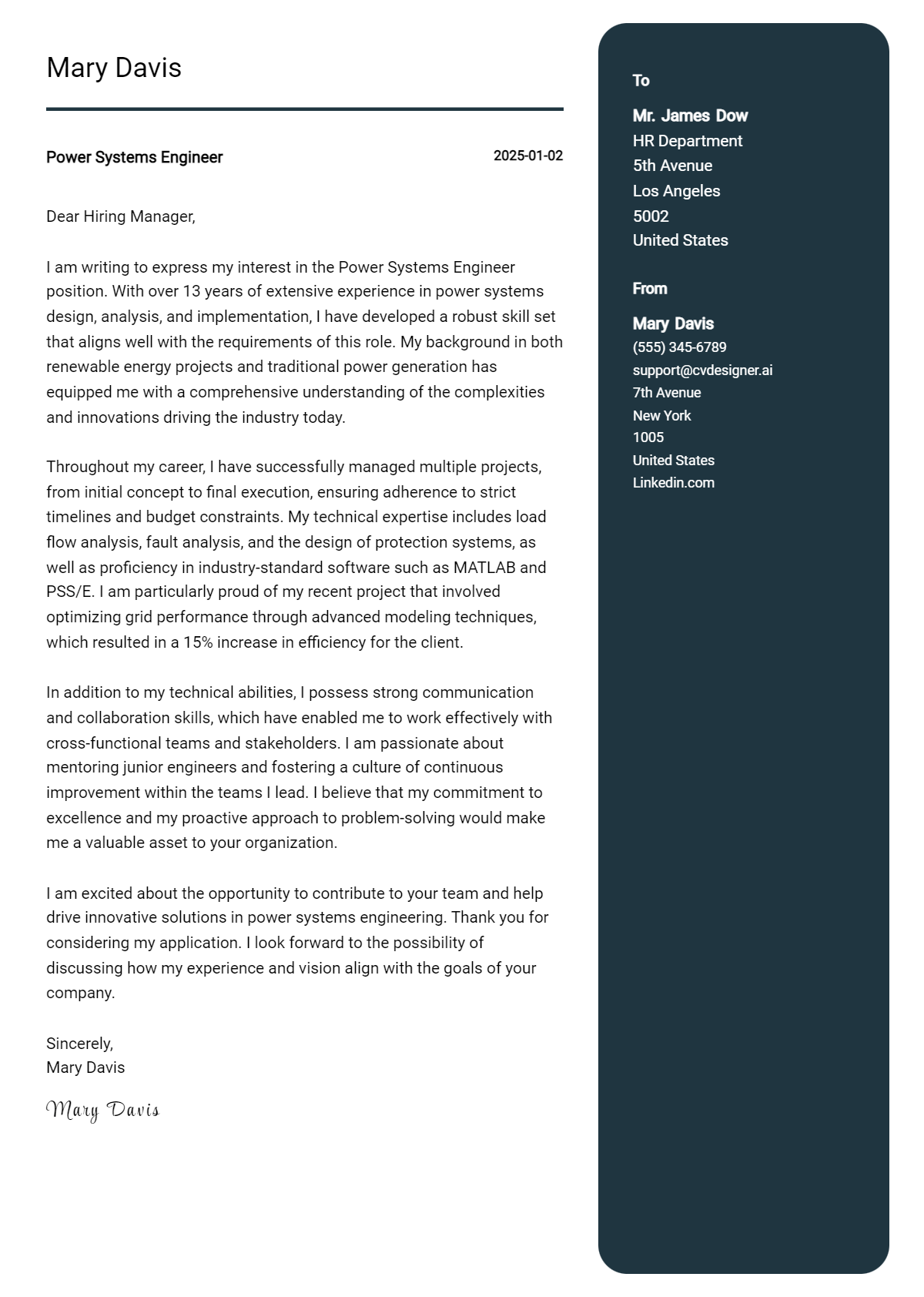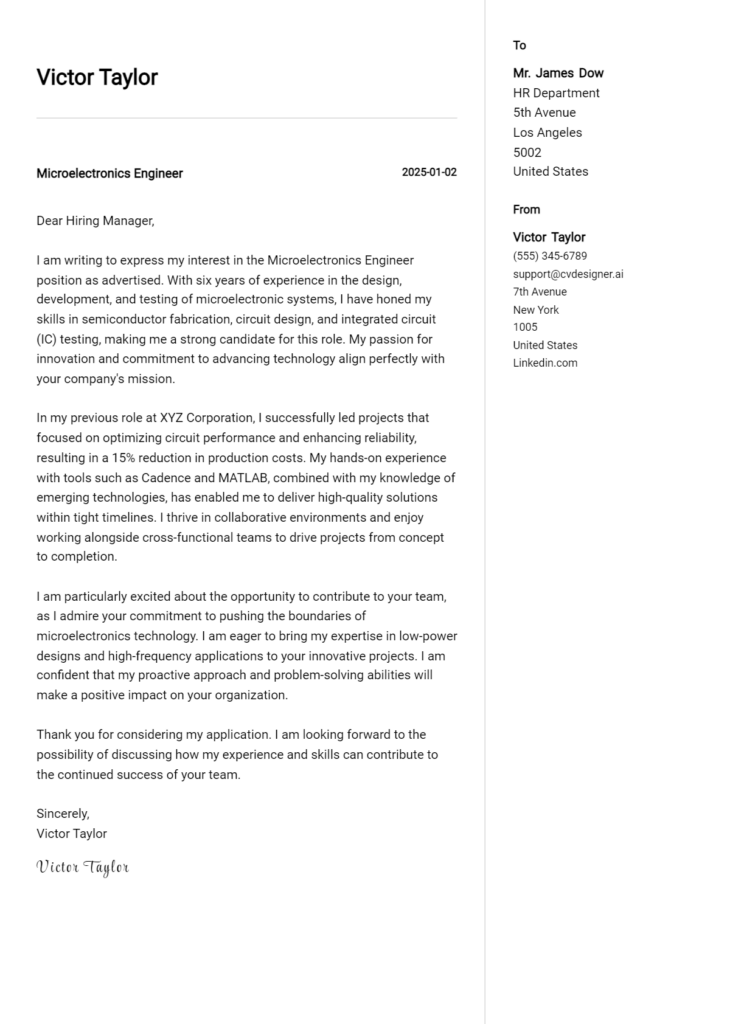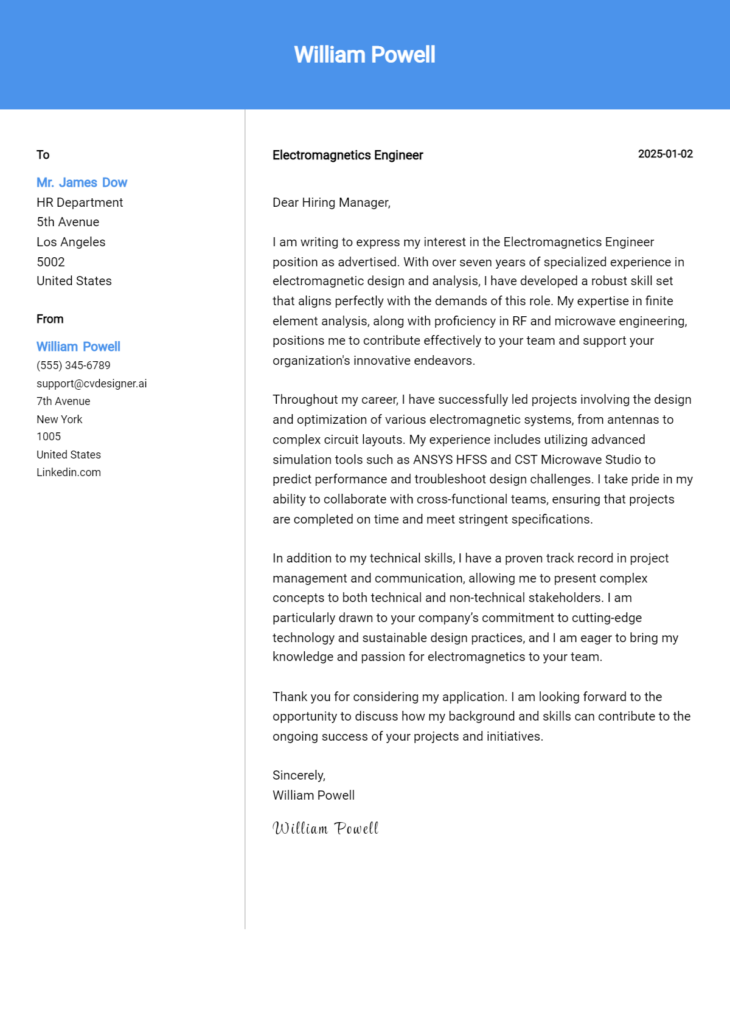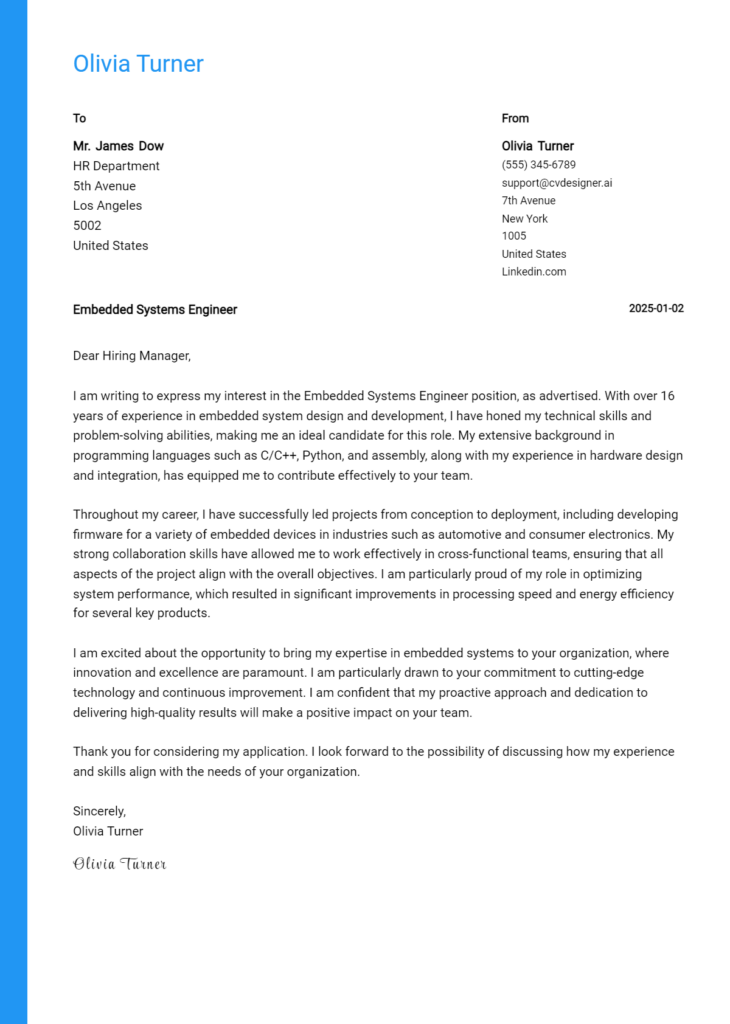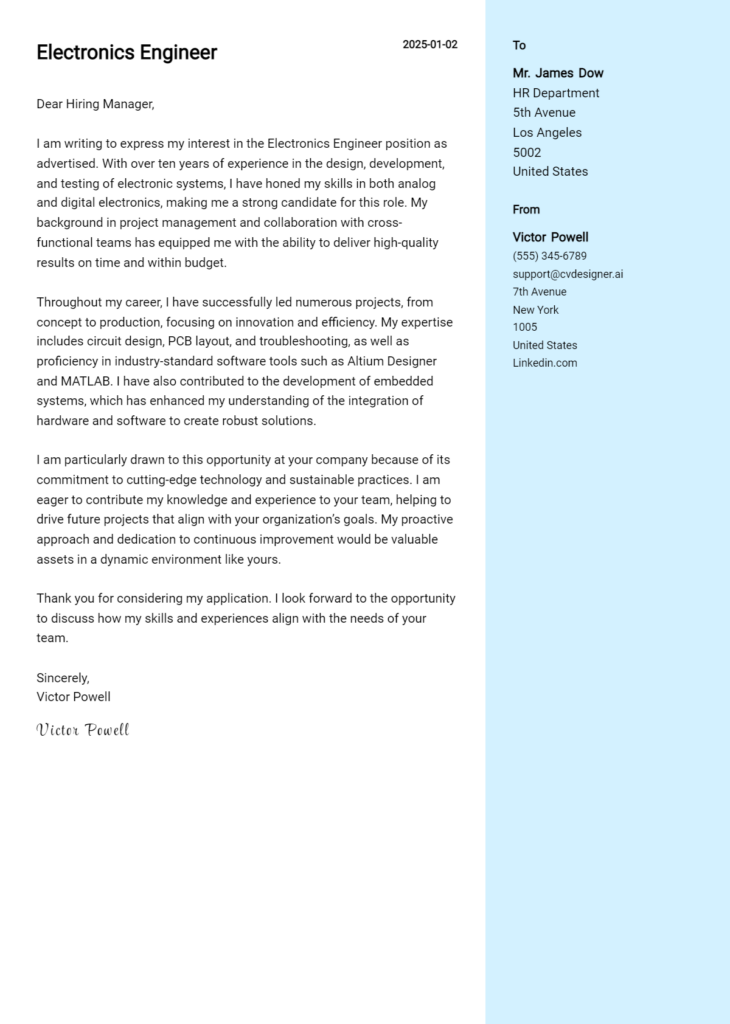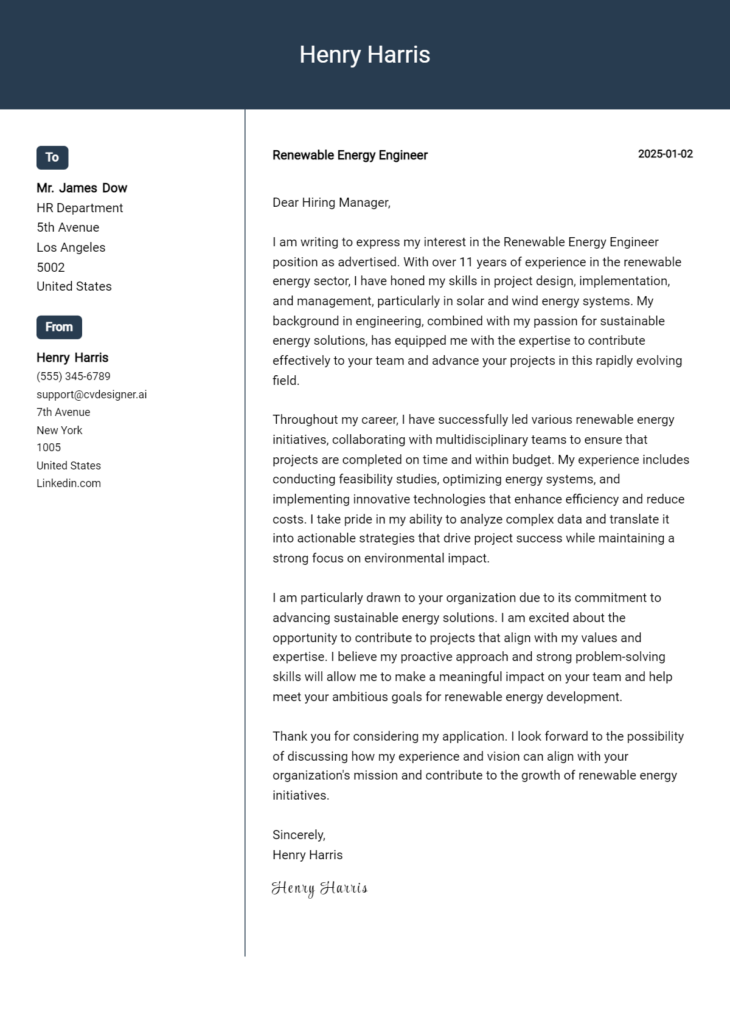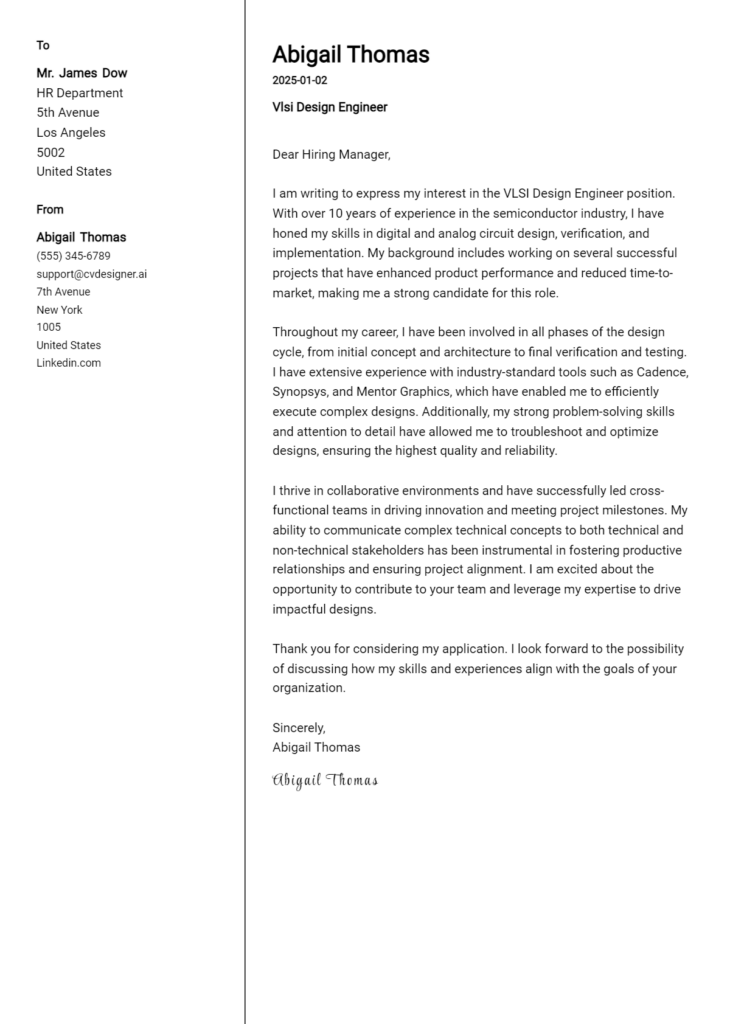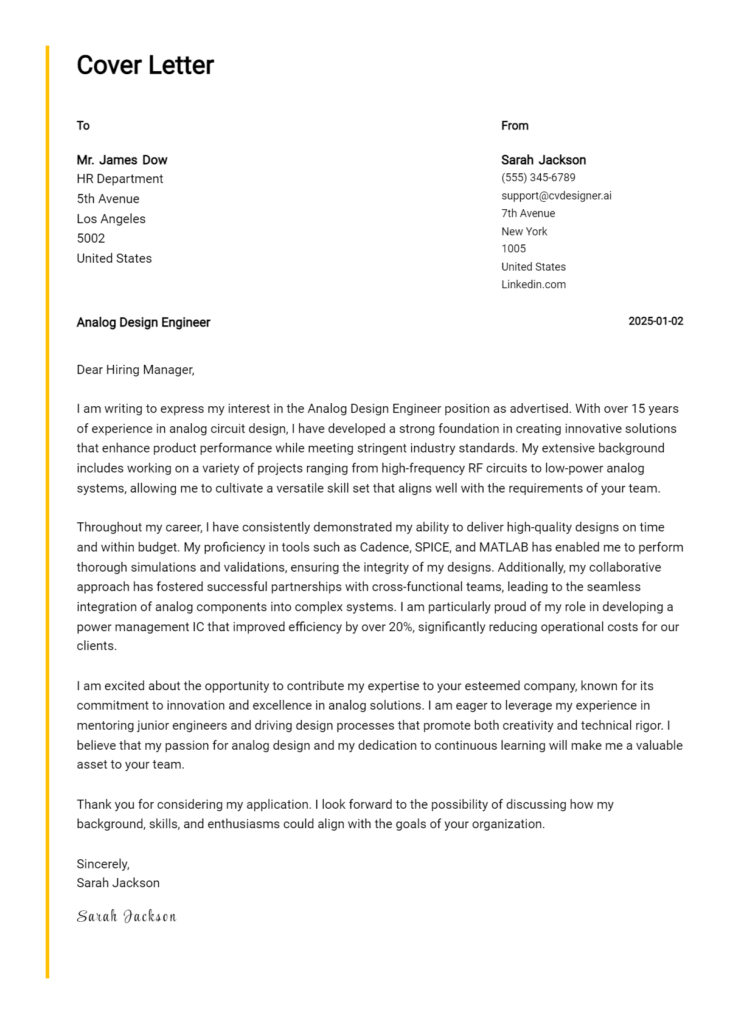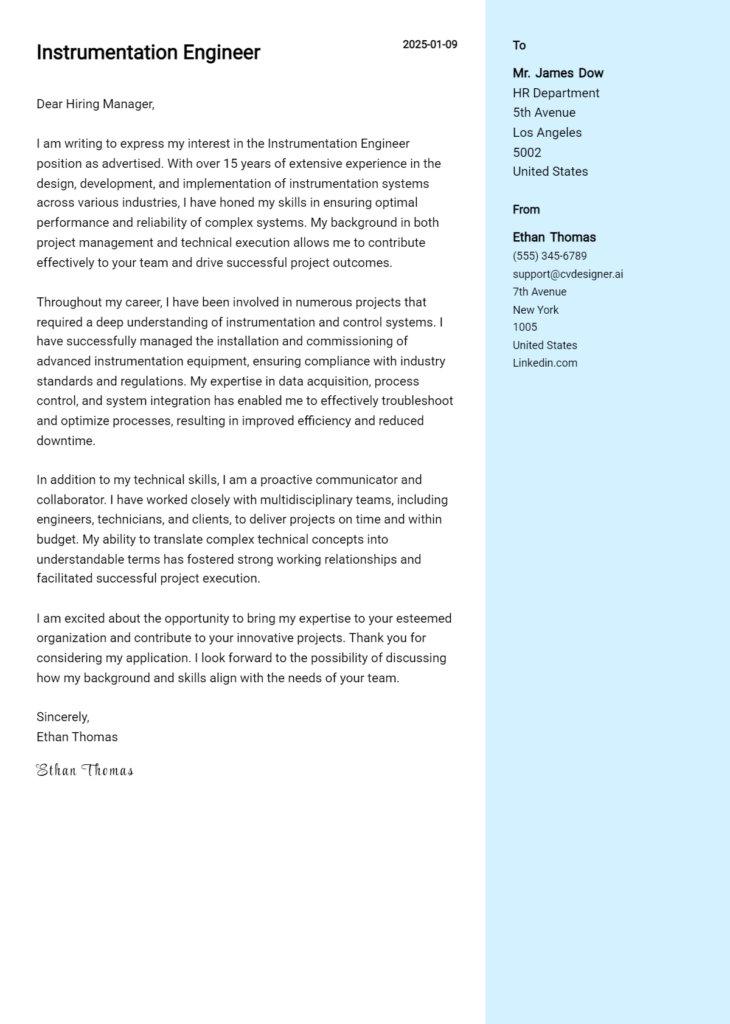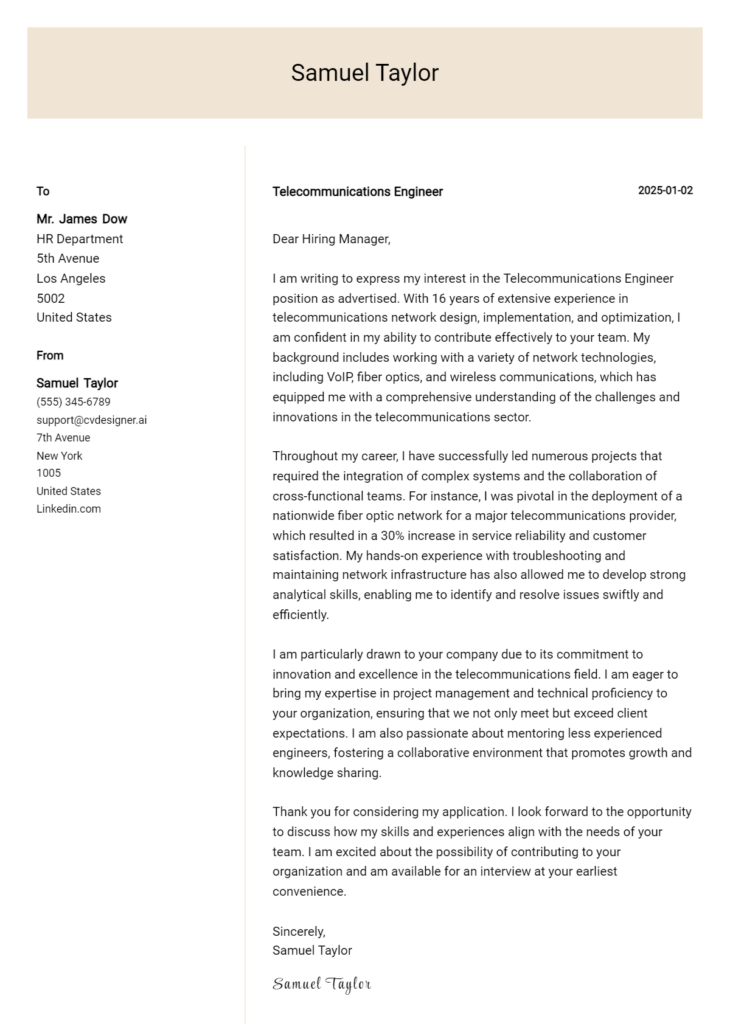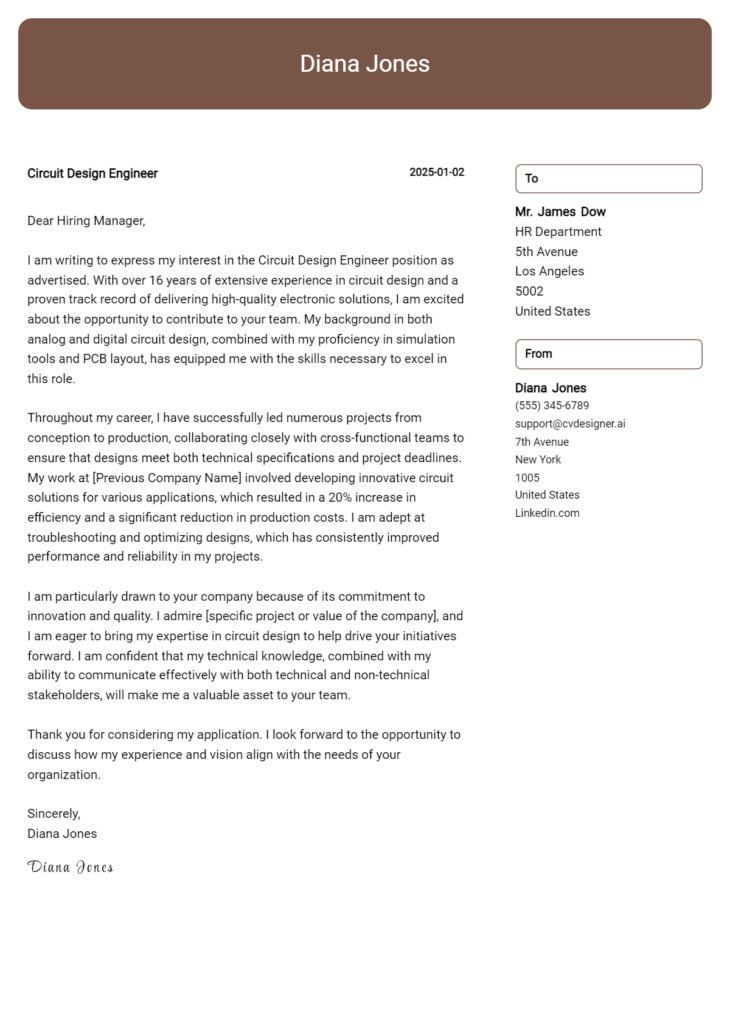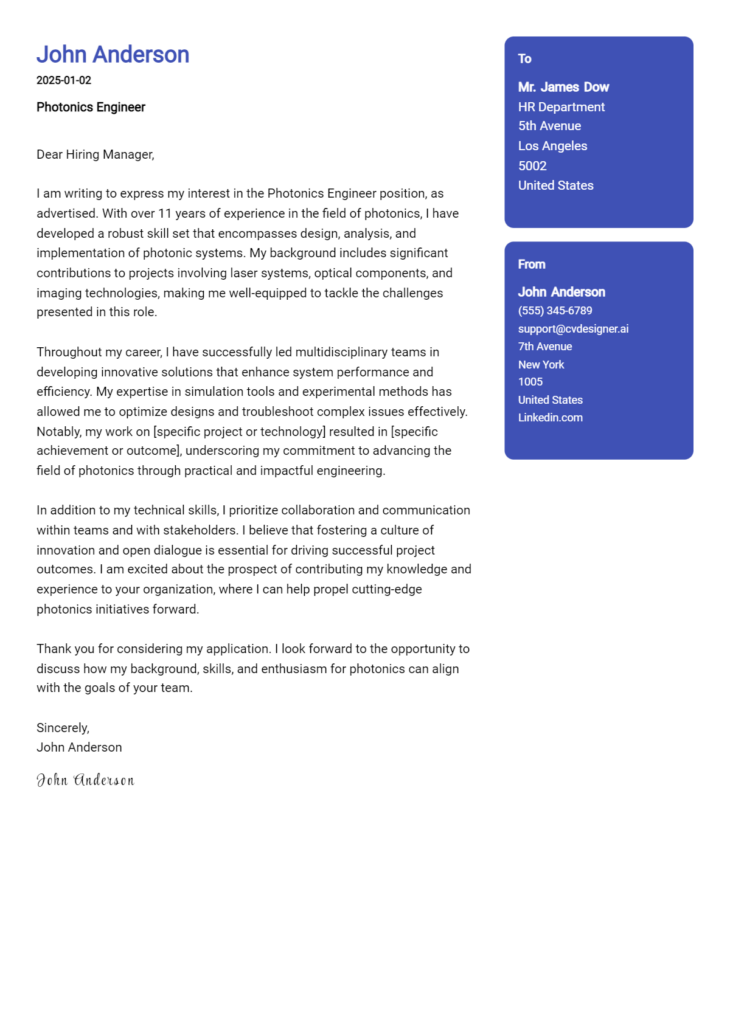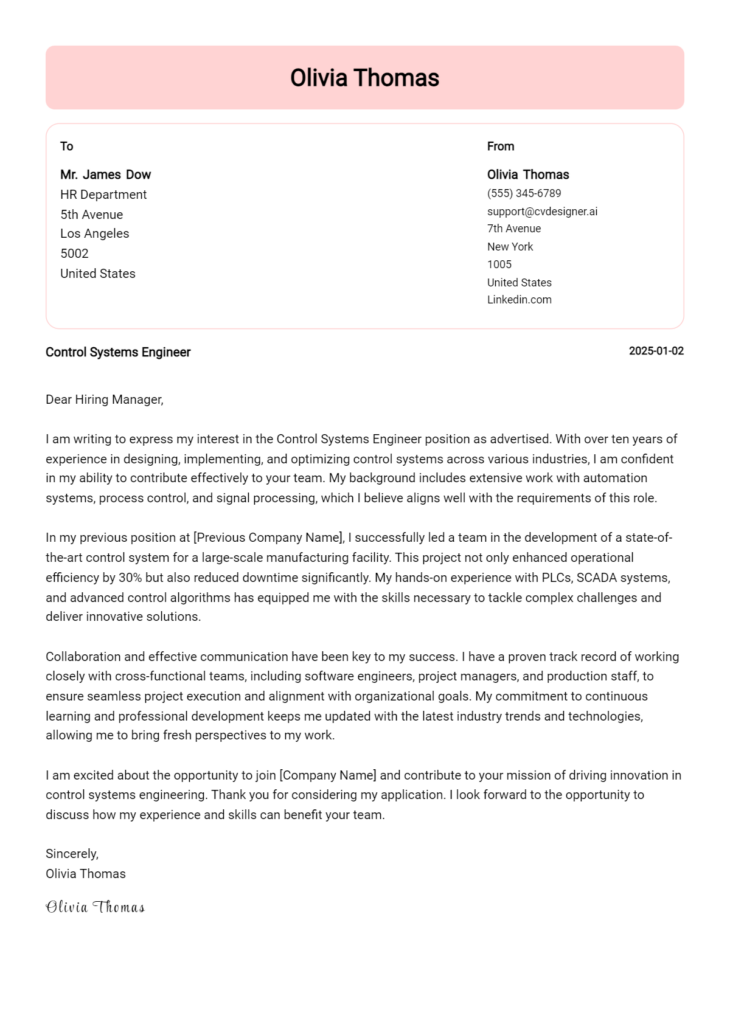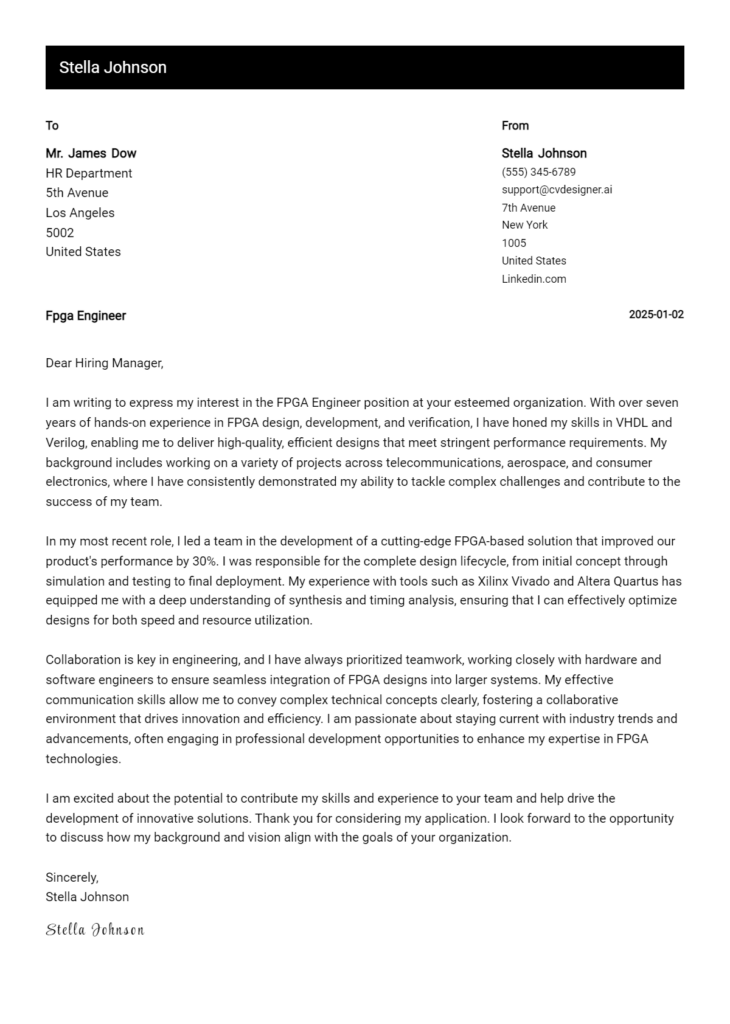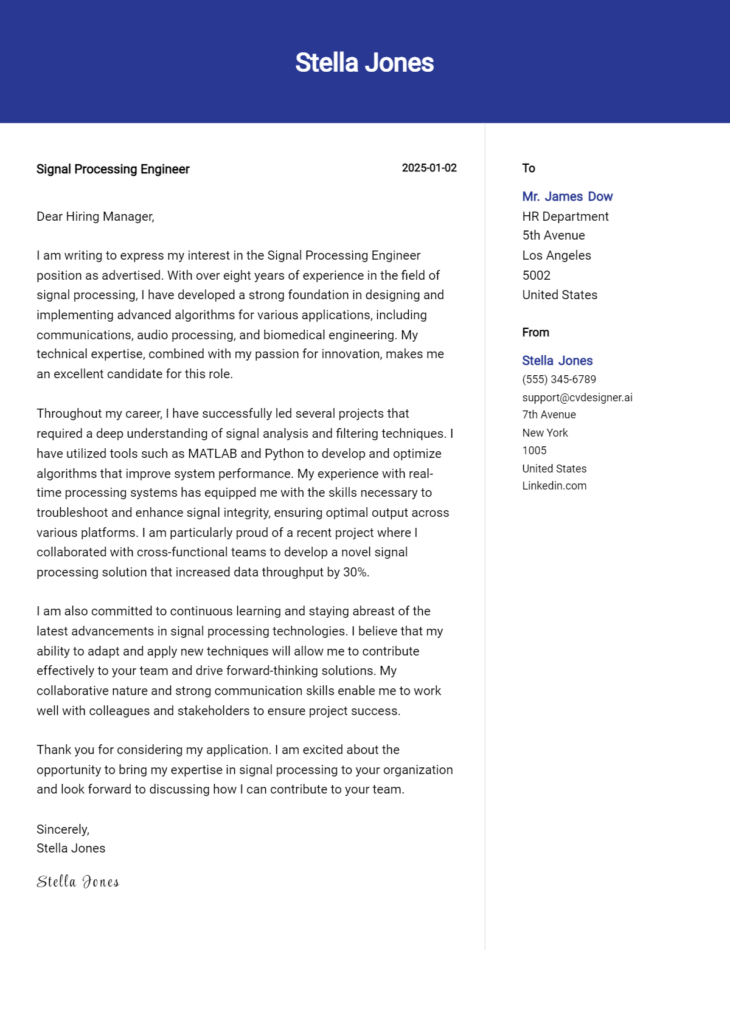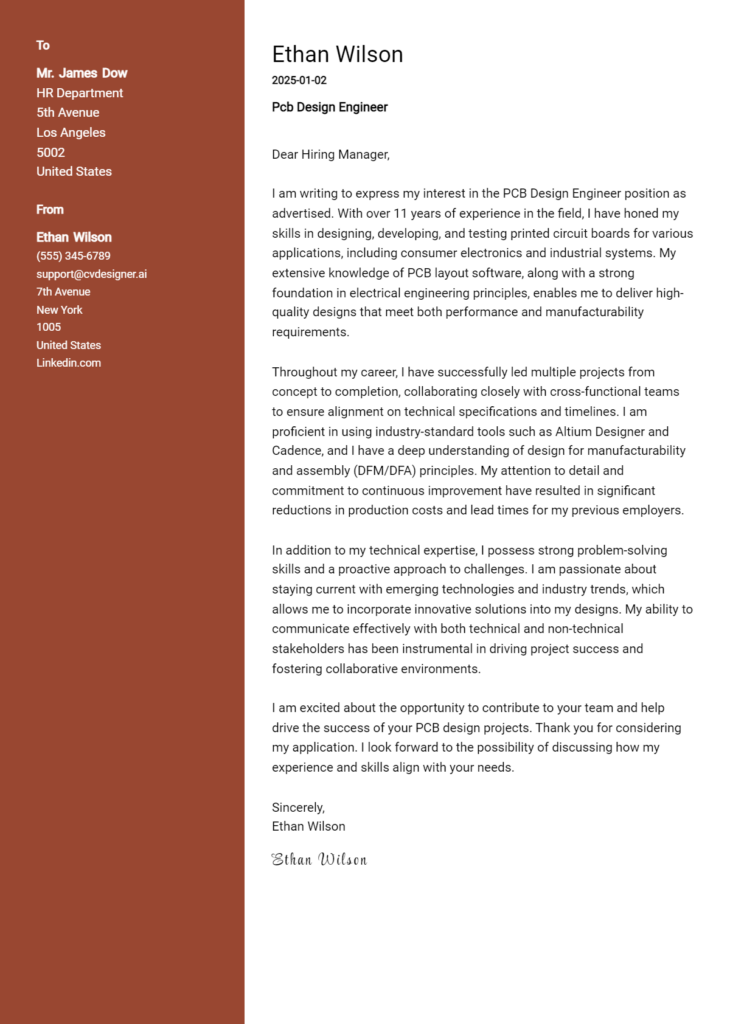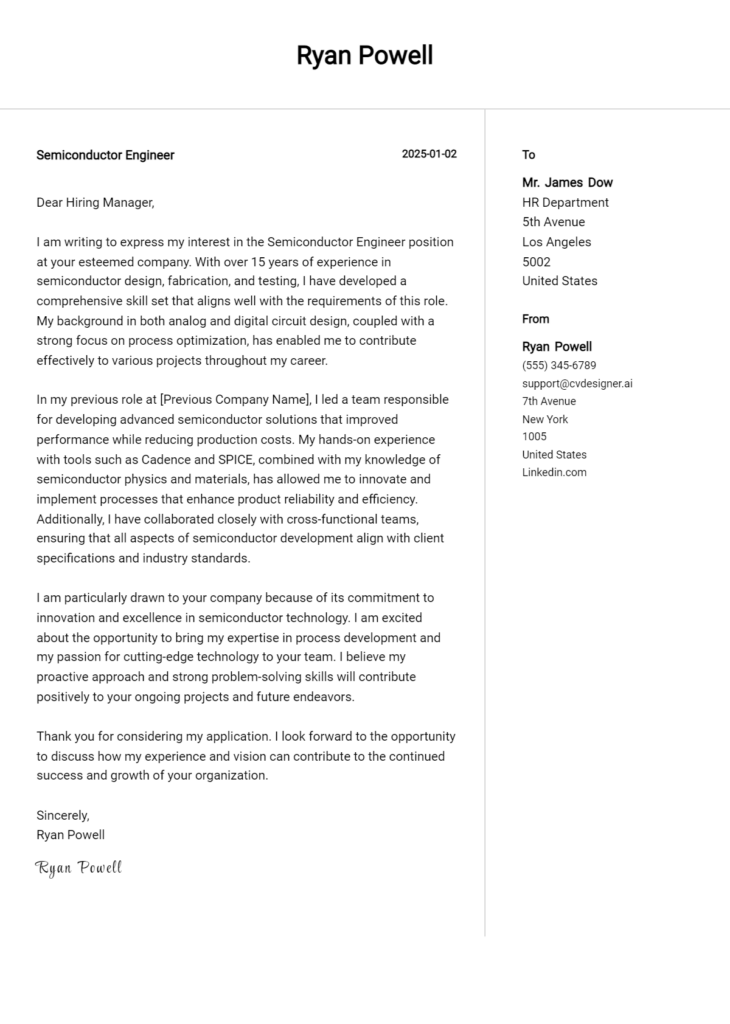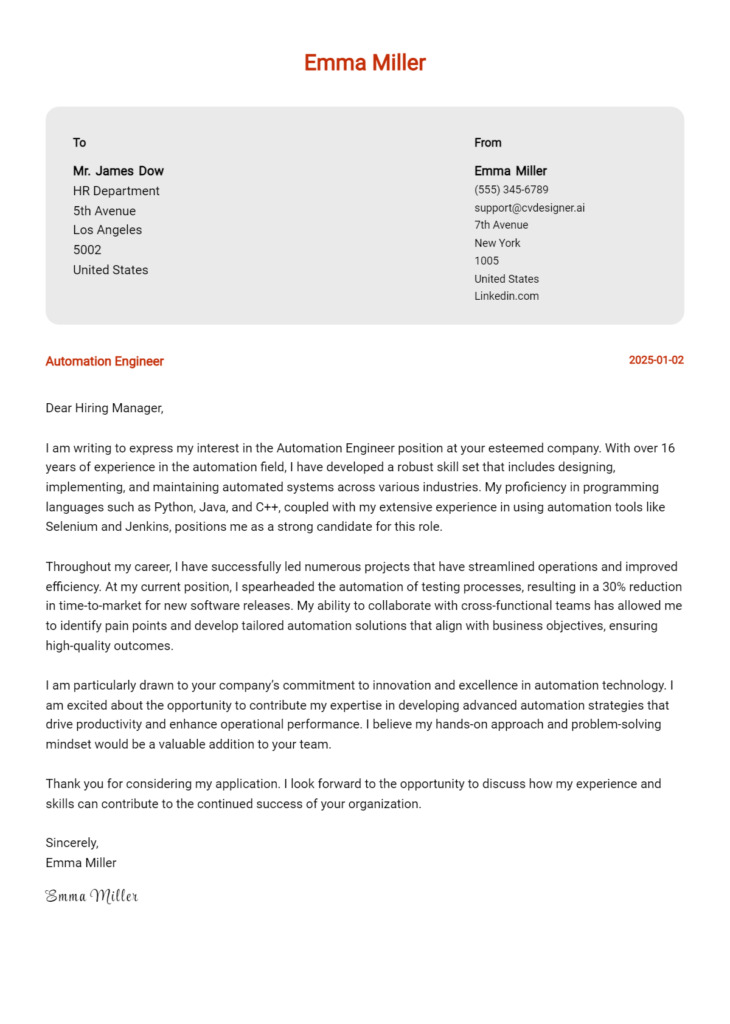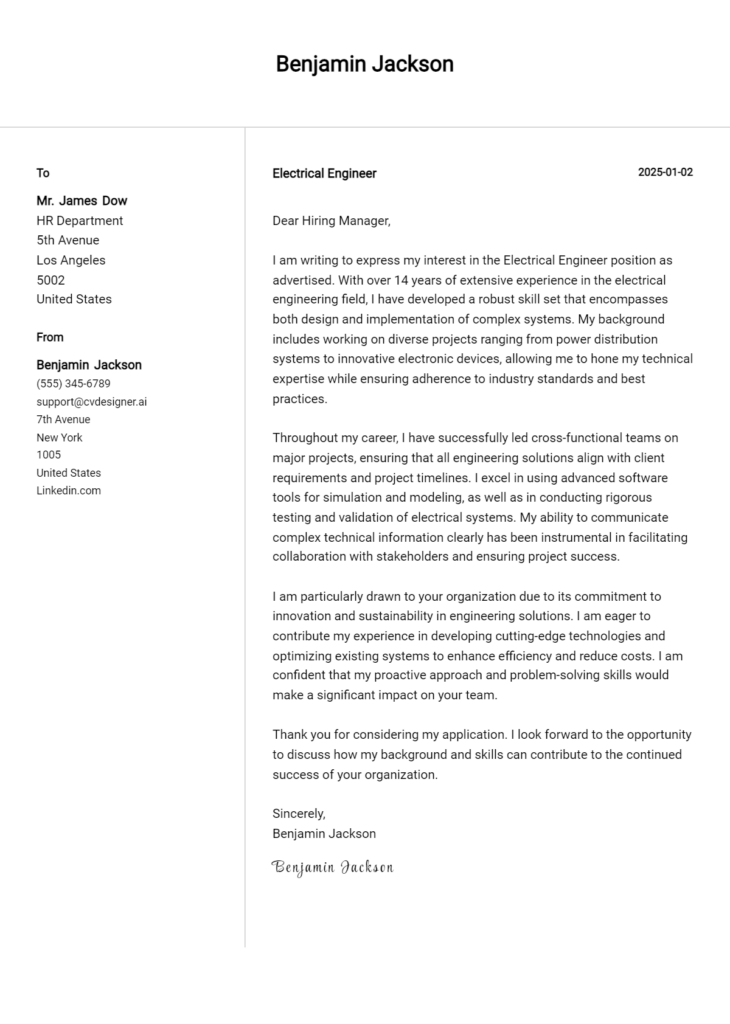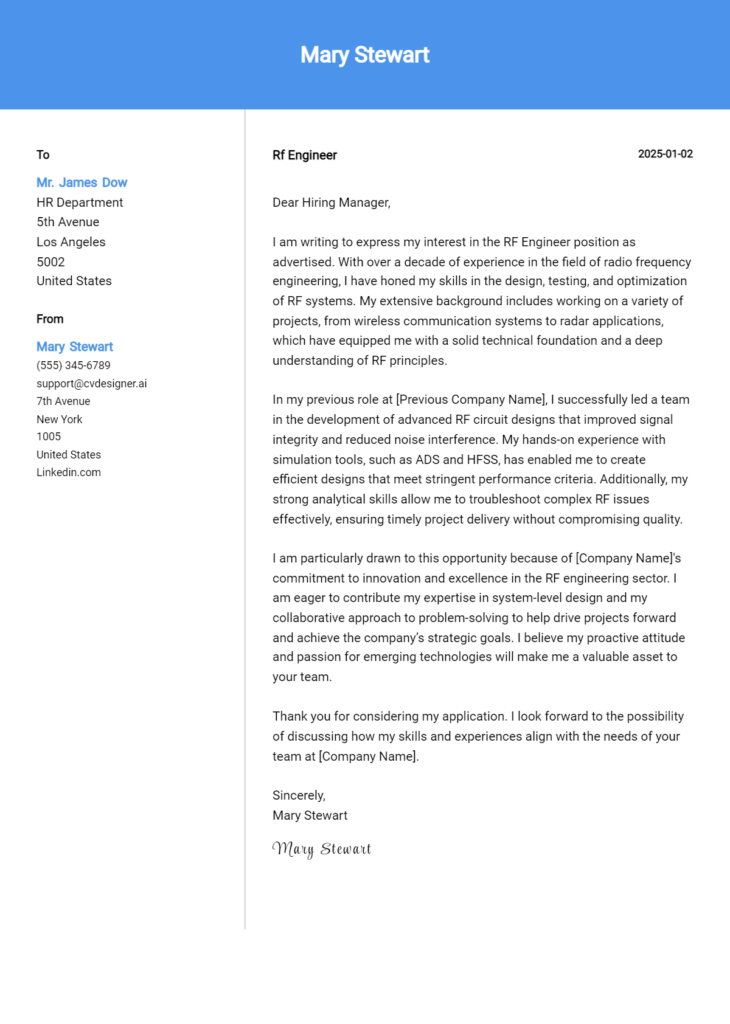Power Systems Engineer Cover Letter Examples
Explore additional Power Systems Engineer cover letter samples and guides and see what works for your level of experience or role.
How to Format a Power Systems Engineer Cover Letter?
Crafting a compelling cover letter for a Power Systems Engineer position is essential, as it not only highlights your technical skills but also demonstrates your ability to communicate complex ideas effectively. The format of your cover letter plays a crucial role in making a first impression, reflecting your methodical approach and attention to detail—qualities that are paramount in the field of power systems engineering.
In this guide, we’ll outline how to structure your cover letter, providing insights and examples tailored specifically for power systems engineers to help you create a persuasive document.
We will focus on the essential components of a professional cover letter, including:
- Cover Letter Header
- Cover Letter Greeting
- Cover Letter Introduction
- Cover Letter Body
- Cover Letter Closing
Each section is critical in emphasizing your qualifications and professionalism. Let’s delve into each part and explore how to make your cover letter stand out in a competitive job market.
Importance of the Cover Letter Header for a Power Systems Engineer
The header of a cover letter is a crucial component that sets the tone for the entire document. It provides the recipient with essential information at a glance, ensuring clarity and professionalism. A well-structured header should include your contact information, the date of submission, and the recipient's details, such as their name, title, and organization. This not only demonstrates your attention to detail but also creates a positive first impression. A strong header conveys your professionalism and makes it easier for the hiring manager to reach out to you.
Strong Example
John Doe 123 Power Lane Energy City, ST 12345 (123) 456-7890 john.doe@email.com November 1, 2023 Jane Smith Hiring Manager Global Energy Solutions 456 Renewable Blvd Energy City, ST 12345
Weak Example
john d. 123 power lane energy city 11/1/23 jane Global Energy
The Importance of a Cover Letter Greeting for a Power Systems Engineer
The greeting of your cover letter serves as the initial point of contact with a potential employer, establishing the tone for the rest of your message. A well-crafted greeting not only conveys professionalism but also reflects your attention to detail and genuine interest in the position. By addressing the hiring manager directly, you create a sense of personalization that can set you apart from other candidates. Avoiding generic greetings like "To Whom It May Concern" can demonstrate that you have taken the time to research the company and its personnel. If you’re unsure of the hiring manager's name, consider looking at the company’s website or LinkedIn page to find the appropriate contact.
Here are some examples of strong and weak greetings for a Power Systems Engineer cover letter:
Strong Greeting Example
Dear Dr. Smith,
Weak Greeting Example
To Whom It May Concern,
The Importance of a Captivating Cover Letter Introduction for a Power Systems Engineer
A well-crafted cover letter introduction is crucial for a Power Systems Engineer as it sets the tone for the entire application. This opening paragraph serves as the candidate's first impression, making it essential to capture the hiring manager's attention immediately. A strong introduction not only expresses genuine interest in the role but also succinctly highlights key skills or achievements that align with the job requirements. This approach not only showcases the candidate's qualifications but also demonstrates their enthusiasm and commitment to the field. Below are examples of both strong and weak cover letter introductions for this role.
Strong Example
Dear [Hiring Manager's Name], I am excited to apply for the Power Systems Engineer position at [Company Name] as advertised on [Job Board]. With over five years of experience in designing and implementing innovative power distribution solutions, I have successfully led projects that improved system efficiency by 30% and reduced operational costs significantly. My passion for advancing sustainable energy technologies drives my commitment to excellence, and I am eager to bring my expertise to your esteemed team.
Weak Example
To Whom It May Concern, I am applying for the Power Systems Engineer job. I have some experience in the field and think I could be a good fit. I have worked on a few projects, and I am hoping to find a job soon.
Purpose of the Cover Letter Body for a Power Systems Engineer
The body of a cover letter for a Power Systems Engineer serves as a pivotal opportunity for candidates to articulate their technical expertise and relevant experiences that align with the company's needs. This section should effectively communicate the candidate’s skills, demonstrate their past accomplishments, and highlight the value they can bring to the organization. By referencing specific projects, such as a successful grid integration or renewable energy system design, the candidate can illustrate their problem-solving capabilities and innovation in the field. A well-crafted cover letter body not only showcases qualifications but also conveys enthusiasm for the role and the potential impact on the company's mission.
Strong Example
As a Power Systems Engineer with over five years of experience in the energy sector, I have successfully led multiple projects focused on the integration of renewable energy sources into existing power grids. One of my notable achievements was spearheading a project that increased solar power integration by 30% while maintaining grid stability. This experience allowed me to enhance my skills in power flow analysis and system design, which I believe will be invaluable at [Company Name]. I am particularly excited about your commitment to sustainable energy solutions and look forward to contributing my expertise to further advance your projects.
Weak Example
I have worked in power systems for a few years and think I would be a good fit for this job. I have done some projects, but I can't remember all the details. I am very interested in working for [Company Name] because I like energy and technology. I believe I can help your team.
Importance of a Cover Letter Closing for a Power Systems Engineer
The closing paragraph of a cover letter is crucial for leaving a lasting impression on the hiring manager. For a Power Systems Engineer, it serves to summarize key qualifications, reaffirm enthusiasm for the position, and encourage the next steps such as reviewing the resume or scheduling an interview. A strong closing encapsulates the candidate's relevant skills and expresses eagerness to contribute to the team, while a weak closing can leave the impression of disinterest or lack of professionalism.
Strong Example
Thank you for considering my application for the Power Systems Engineer position at [Company Name]. With my extensive background in power system analysis and my passion for developing sustainable energy solutions, I am excited about the opportunity to contribute to your team. I look forward to the possibility of discussing my qualifications further and exploring how I can help [Company Name] achieve its goals. Please feel free to contact me to schedule an interview at your convenience.
Weak Example
Thanks for reading my letter. I hope you look at my resume. It would be nice to talk sometime, but I understand if you’re busy.
Crafting an effective cover letter is crucial for Power Systems Engineer candidates looking to stand out in a competitive job market. A well-written cover letter not only highlights your technical skills and problem-solving abilities but also demonstrates your knowledge of the Software Development Life Cycle (SDLC), your capacity for teamwork, and your passion for continuous learning. Below are some tips to help you create a compelling cover letter that showcases your qualifications and enthusiasm for the role.
Tips for Writing a Cover Letter for a Power Systems Engineer
Highlight Relevant Technical Skills
Use your cover letter to emphasize your technical expertise in power systems engineering. Mention specific software tools, programming languages, or methodologies that you are proficient in, such as MATLAB, Simulink, and SCADA systems. Relate these skills to the job description to show how they align with the employer's needs.Showcase Problem-Solving Abilities
Employers seek candidates who can tackle complex engineering challenges. Illustrate your problem-solving skills by sharing a brief example of a project where you successfully identified a problem, proposed a solution, and implemented it effectively. This demonstrates your analytical thinking and ability to deliver results.Demonstrate Knowledge of SDLC
Understanding the Software Development Life Cycle (SDLC) is key for a Power Systems Engineer, especially in roles involving software integration and development. Discuss your familiarity with the various phases of the SDLC, and provide examples of how you've participated in projects that required close adherence to these processes.Emphasize Teamwork and Collaboration
Power systems engineering often involves working in multidisciplinary teams. Highlight your experience collaborating with other engineers, stakeholders, and project managers. Share a success story that showcases your ability to work effectively within a team, emphasizing communication and leadership skills.Express a Passion for Continuous Learning
The field of power systems engineering is constantly evolving, making it essential to stay updated with the latest technologies and trends. Mention any courses, certifications, or professional development activities you are pursuing or have completed. This demonstrates your commitment to growth and adaptability in a fast-paced industry.
For more assistance, consider using cover letter templates or a cover letter builder to help format your ideas effectively. These tools can streamline the writing process and ensure your cover letter is polished and professional.
Common Mistakes to Avoid in a Power Systems Engineer Cover Letter
Crafting an effective cover letter is essential for standing out in the competitive field of power systems engineering. Avoiding common mistakes can significantly enhance your chances of making a positive impression on potential employers. Here are some prevalent pitfalls to watch out for:
Generic Content: A cover letter that lacks personalization may convey a lack of interest. Tailor your letter to the specific job and company by mentioning relevant projects or values.
Neglecting Formatting: Poorly formatted letters can be hard to read and look unprofessional. Adhere to a clear cover letter format with proper spacing, font size, and alignment.
Repetition of the Resume: Simply repeating what’s on your resume can bore the reader. Instead, highlight key achievements and explain how they relate to the job.
Overuse of Technical Jargon: While it’s important to demonstrate technical expertise, excessive jargon can alienate non-technical hiring managers. Strive for clarity and conciseness.
Ignoring the Job Description: Failing to address the qualifications and responsibilities outlined in the job description can indicate a lack of attention to detail. Use keywords from the listing to align your experiences with the requirements.
Lack of Enthusiasm: A cover letter that lacks passion may not resonate with the reader. Express genuine interest in the role and the company to convey your enthusiasm.
Errors and Typos: Grammatical mistakes can undermine your professionalism. Always proofread your letter carefully or ask someone else to review it.
By steering clear of these common mistakes and utilizing resources like cover letter examples, you can create a compelling cover letter that effectively showcases your qualifications as a Power Systems Engineer.
Cover Letter FAQs for Power Systems Engineer
What should I include in my cover letter as a Power Systems Engineer?
In your cover letter, focus on your technical skills and relevant experiences that align with the job description. Start by introducing yourself and stating the position you are applying for. Highlight your educational background, particularly any degrees in electrical engineering or related fields. Include specific projects or roles where you've designed, analyzed, or improved power systems. Mention any software proficiency, such as MATLAB, PSS/E, or AutoCAD, and certifications like IEEE or specific safety training. Conclude with a brief statement on why you are passionate about power systems engineering and how you can contribute to the company’s goals.
How can I demonstrate my technical skills in my cover letter?
To effectively demonstrate your technical skills, include concrete examples from your work experience. For instance, discuss a project where you successfully implemented a renewable energy system or optimized an electrical grid. Use metrics to quantify your achievements, such as reducing energy losses by a certain percentage or improving system reliability. Mention any collaborations with cross-functional teams or leadership roles in technical groups. This approach gives hiring managers a clear picture of your abilities and shows that you can apply your knowledge practically.
Should I tailor my cover letter for each job application?
Absolutely! Tailoring your cover letter for each application is essential. Research the company and the specific role, then align your experiences and skills with their needs and values. Use keywords from the job description to make your application more relevant. For example, if the job emphasizes renewable energy solutions, highlight your experience in that area. Customizing your cover letter shows your genuine interest in the position and demonstrates that you’ve done your homework, making you a more appealing candidate.
How long should my cover letter be?
Your cover letter should ideally be one page long, consisting of three to four paragraphs. Start with a brief introduction, followed by a descriptive middle section that highlights your qualifications and experiences relevant to the Power Systems Engineer role. Use concise language and avoid overly technical jargon unless necessary. Aim for clarity and readability, ensuring that each paragraph flows logically into the next. A well-structured, succinct cover letter is more likely to hold the reader’s attention and leave a positive impression.
Build your Cover Letter in minutes
Use an AI-powered cover letter builder and have your letter done in 5 minutes. Just select your template and our software will guide you through the process.

